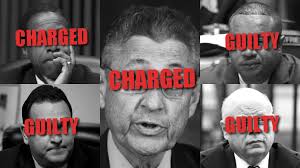Corruption in America
 The focus on the FCPA provides a myopic view of corruption. Bribery of foreign officials is only one slice of the corruption pie. Even though the United States ranks number 19 in Transparency International’s Corruption Perception Index, there is plenty of domestic corruption that occurs at the federal and state level.
The focus on the FCPA provides a myopic view of corruption. Bribery of foreign officials is only one slice of the corruption pie. Even though the United States ranks number 19 in Transparency International’s Corruption Perception Index, there is plenty of domestic corruption that occurs at the federal and state level.
There are two major federal corruption prosecutions that are ongoing and getting significant national attention. The corruption prosecution of former Governor McDonnell in Virginia recently concluded but will continue for a few years while the appeals are resolved.
An examination of some of the more significant US corruption prosecutions reveal many parallels to foreign bribery schemes – some sophisticated and some not so sophisticated. Many involve third parties who are conduits or active participants in bribery schemes. And, of course, corruption schemes in the US sometimes rely on shell companies and other means to disguise proceeds of criminal activity.
New York State has been at the forefront of political corruption. Recently, Sheldon Silver, the speaker of the New York Assembly, was indicted on corruption charges. As alleged, Speaker Silver obtained millions of dollars in bribes and kickbacks from a fictitious law practice, which Speaker Silver created to mask over $4 million in payoffs over the last decade.
Speaker Silver is accused of steering real estate developers to a law firm that paid him kickbacks. In addition, he allegedly funneled state grants to a doctor who referred asbestos claims to another law firm that employed Speaker Silver and gave him fees for referring the clients. Speaker Silver performed no work at the law firm but received $1.4 million in salary and $3.9 million in referral fees.
Speaker Silver’s case caps off a decade in which more than 30 current or former New York state officeholders have been convicted or charged with criminal offenses.
Albany has been characterized as a “cesspool” of corruption. Malcolm Smith, the former majority leader of the New York State Senate was convicted this past week of federal corruption charges. Smith was accused of conspiring to pay a former Republican city councilman and three Republican county leaders thousands of dollars to run for mayor of New York City on the Republican ballot in 2013.
Corruption in the United States is not limited to state officials – plenty of federal officials have been caught in the corruption crosshairs. Rep. Grimm from New York recently plead guilty and is awaiting sentencing. Former Representative Jesse Jackson plead guilty in February 2013 to taking around $750,000 worth of campaign funds to purchase watches, cars, jewelry and other items. Former Arizona Representative Rick Renzi was sentenced to three years in prison for public corruption and money laundering offenses.
Corruption continues to grow at the state and local level. New York is certainly not the only state in which corrupt officials have been caught. In New Jersey, for example, three mayors were prosecuted for involvement in a plot involving the sale of kidneys. Of course, who can forget former Gov. Blagojevich in Illinois for his sale of an Illinois Senate seat.
In California, State Senator Leland Yee an advocate for gun control has been indicted for conspiring to illegally deal firearms with known gangsters in San Francisco, California.
Just last week, the infamous “Fat Leonard,” a Malaysian contractor at the center of a corruption scandal involving the US Navy, plead guilty to fraud charges and admitted bribing officials with cash, prostitutes, Cuban cigars and Kobe beef. He was the ringleader of a ten-year corrupt campaign involving tens of millions of dollars in bribes. Five current and former naval officers have been charged in the scandal.
 Fat Leonard routinely overbilled for services and gave Naval officers gifts of cash, hundreds of thousands of dollars in prostitution services, luxury hotel stays, spa treatments, lavish meals, Cuban cigars, designer handbags, watches, fountain pens, furniture, electronics and other items. In return, Naval officers gave him classified and confidential information, and gave him preferential treatment in the contracting process.
Fat Leonard routinely overbilled for services and gave Naval officers gifts of cash, hundreds of thousands of dollars in prostitution services, luxury hotel stays, spa treatments, lavish meals, Cuban cigars, designer handbags, watches, fountain pens, furniture, electronics and other items. In return, Naval officers gave him classified and confidential information, and gave him preferential treatment in the contracting process.
Corruption is alive and well in the United States. A blind focus on FCPA corruption can give you a false perspective. US companies cannot overlook the domestic risks of corruption – bribery and kickbacks – are just as possible (if not more so) in the United States.















